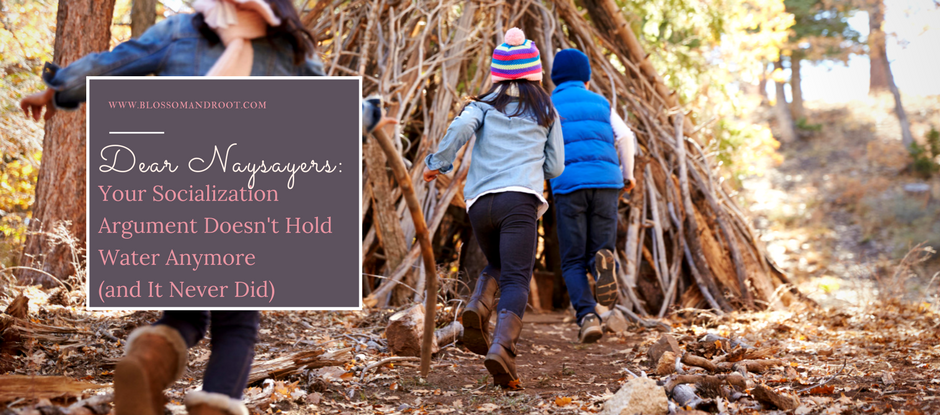Before I begin, I want to be clear about something. I am not “anti-public school.” I went to public school. I had a positive experience in public school. I know that, for many parents, public school is the best choice for their family. I support public school teachers and administrators, and I believe that the decisions we make about educating our children are highly personal and vary greatly from family to family, and even from child to child. But this socialization argument needs to go.
Why is this the first thing that pops into people’s minds when they want to argue against homeschooling? It baffles me. The stereotype of the shut-in, isolated homeschooler is so outdated and inaccurate. Just spend five minutes scrolling homeschool-related hashtags on Instagram and you’ll see what I mean. Those kids are making solar panels out of recycled materials in their STEM co-ops. They’re reading to people at the local retirement home. They’re running amuck with their forest playgroups, rehearsing with their community theatre troupe, collecting canned foods for the needy, touring the local fire station, hosting book clubs, and traveling the world. Sure, there are occasions where that tired old stereotype might be true, but they’re certainly not the norm. There are so many reasons I cringe whenever people cry “socialization” and it’s almost overwhelming trying to decide where to start. Let’s break down a few of those classic arguments…
Argument #1: If your child doesn’t go to school, they’ll never get socialized!

Counter-Argument: Socialization is only an argument for school when you’re not in it.
Maybe the people who say this went to a different kind of school than I did, because the schools I went to were adamant about making sure we knew we were not there to socialize. I got pretty good grades, but most of my report cards included the note that I needed to stop socializing in class. My husband recalls spending much of his elementary years at a desk in the hallway alone for the same reason. Why is it that, when we are talking about homeschooling, suddenly public school is all about socializing but when you’re in public school, the last thing you’d better be up to while you’re there is socializing?
“Well,” you may argue, “not in class per se. But at recess…” (Ah, yes, the recess that is now down to a national average of 27 minutes per day…if you’re lucky enough to get it in the first place…) “and at lunch” (do you mean the meal where children are often directed to eat as quickly as possible and not speak at all?) “and in extra-curricular activities.” (We have those too.)
Any publicly-schooled individual can very likely close their eyes and recall, with pin-point accuracy, the voice of at least one of their former teachers saying “we are not here to socialize.”
So let’s go ahead and take that argument off the table.
Argument #2: School is where your child forms critical friendships.
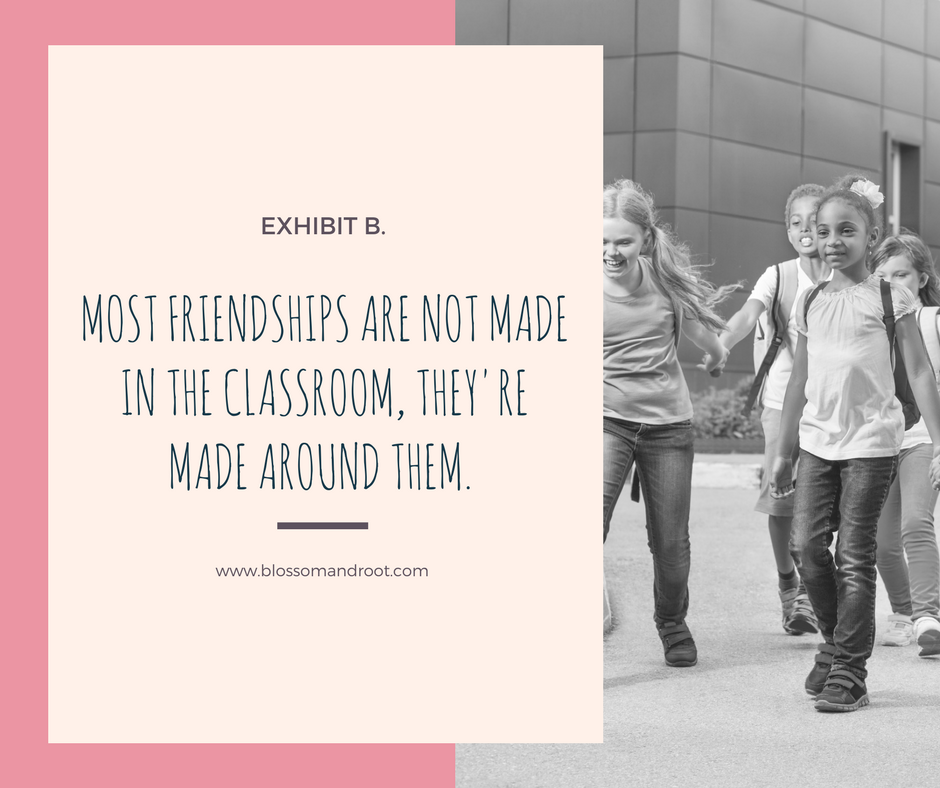
Counter-Argument: Most friendships are not made in the classroom, they’re made around them.
Once again, a classroom is not often a very efficient place to make friends. You’re in that classroom to learn, after all. It can be tricky getting to know people when you’re supposed to be listening to the teacher. The friendships most children develop “in school” happen around the classroom, not in it. They make friends during recess, over lunch, in the hallway, at their after-school activities, walking home from school, etc. Well, the same is true of homeschoolers. When we’re in the middle of our lesson time, we’re busy learning. We make friends, typically, outside of this concentrated learning time–during free play, at co-ops, in community organizations like 4-H or the scouts, at church groups, in dance or sports, at the park, in the world at large!
There is this misconception that friendships are only meant to be formed at school, but the truth is that they can (and should) happen in many different settings. So that argument is out, too.
Argument #3: Homeschoolers are at a disadvantage because they need to know what it’s going to be like in the real world.
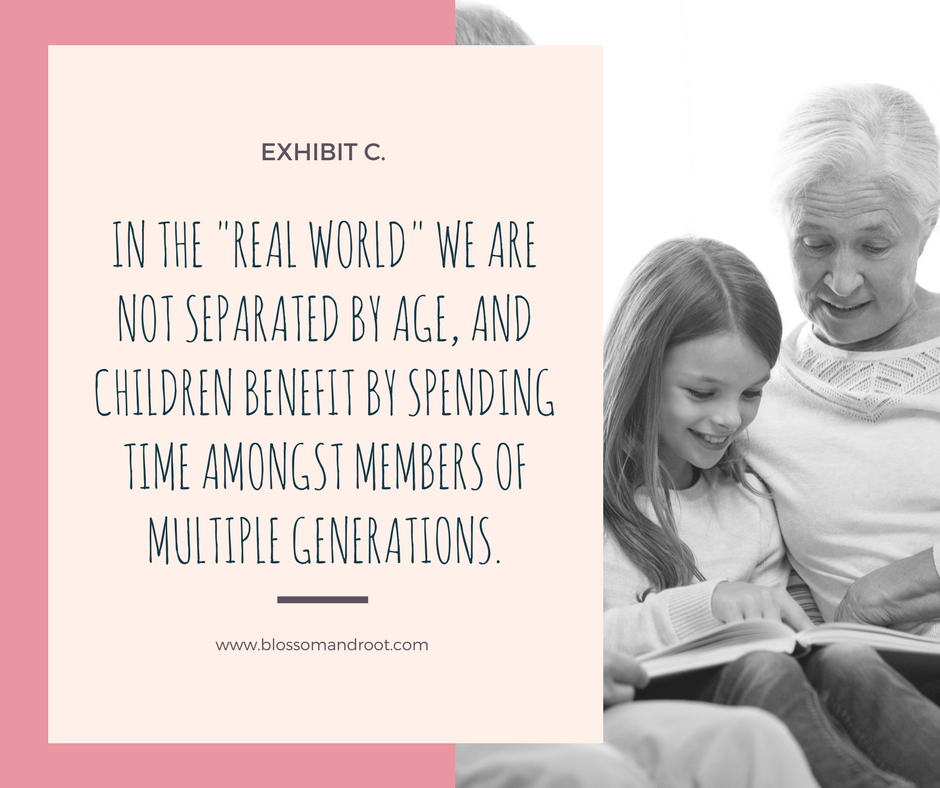
Counter-Argument: In the “real world” we are not separated by age, and children benefit from spending time amongst members of multiple generations.
This is one of the weirdest arguments of all, if I’m being honest. I’ve heard it several times–school is where children learn to operate “in the real world.” School is a lot of things, but a model of the world at large is not one of them. Sticking to the “socialization” focus, let’s break down the reality of a publicly-schooled child’s typical day. They spend around 8 hours, every weekday, surrounded by people within a year of their own age and a handful of adults. Never in my adult life have I even been in one room with 30 other people my age. I didn’t even go to college with people my own age.
In the “real world” we are thrust amongst multiple generations at every turn–in the workplace, on the bus, at the store, in the meeting hall, everywhere. We have to get along with people older than us, younger than us, and from a huge variety of socio-economic backgrounds. In my humble opinion, most homeschoolers go into that world far more prepared for these interactions because most homeschoolers spend time with a large variety of ages from the get-go.
So the “socialization in the real world” argument is not only out, but it’s ten points to the homeschoolers for having the advantage where that’s concerned.
Argument #4: Children need to go to school so they can learn how to deal with bullies.
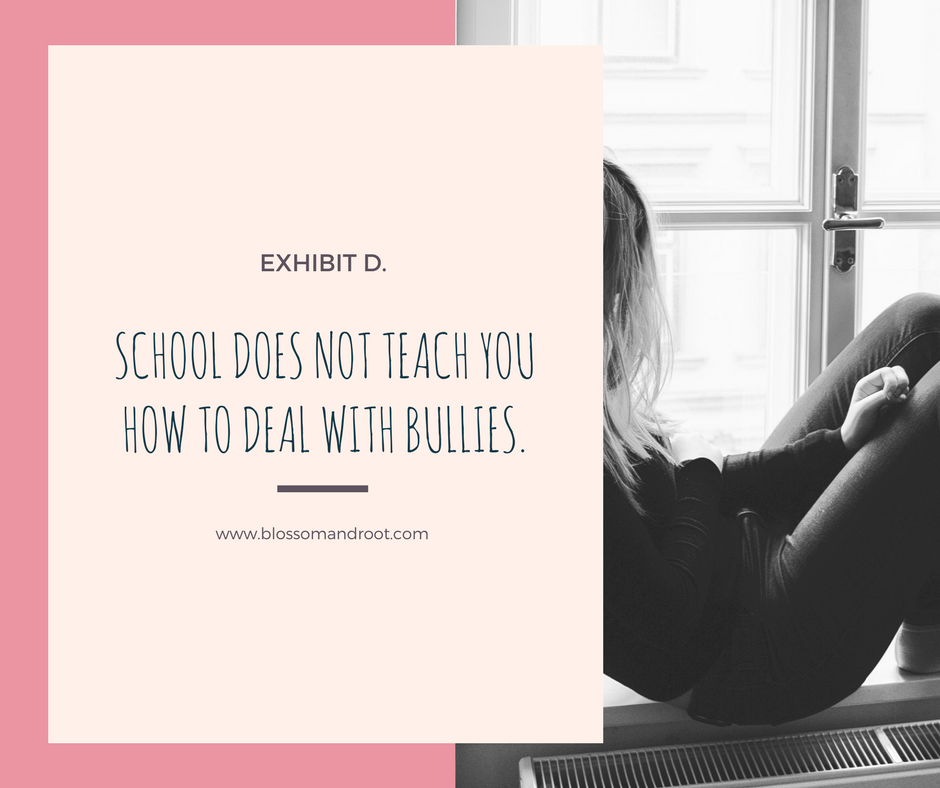
Counter-Argument: School does not teach you how to deal with bullies.
I detest this argument above all other arguments. First of all, I’m pretty sure when public education came to be, the people who invented it weren’t thinking: “ah, yes, we shall create a sanctuary for learning where children will have access to great literature, scientific investigation, the rich tapestry of history, and of course to learn how cruel other children can be. A well-rounded education.” Let me tell you something. Children will discover that some people are rude, mean, and hurtful no matter where they do their learning.
Here’s the most significant weakness of that argument: school does not teach you how to deal with bullies. Ask the mom whose son was so tired of being picked on, with the administration unable to do anything about it, that he hit back and was swiftly suspended or expelled for his retaliation. Ask the girl who cries herself to sleep every night because the pack of mean girls in the hallway relentlessly teases her between classes. Ask the parents who have lost their children forever to the consequences of bullying in schools. This argument is not only ridiculous, it’s dangerously insensitive. Schools don’t teach you how to deal with bullies. Parents might (mine did.) Books and movies might (ideally ones that teach resilience and taking the high road over violence and counter-cruelty.) Community organizations and faith-based groups might. But schools really don’t. The best you can hope for is a really great teacher that addresses it appropriately and makes sure their pupils know that they have their back, but that’s certainly not a guarantee.
Argument #5: Children in schools have more opportunities to make friends and interact with others.
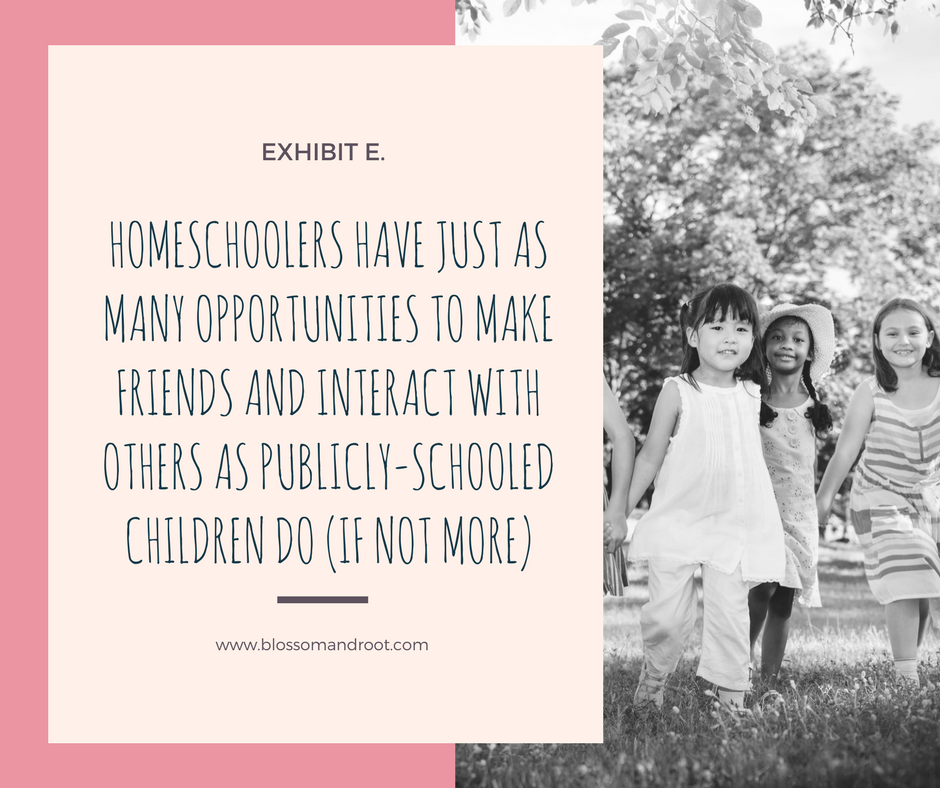
Counter-Argument: Homeschoolers have just as many opportunities to make friends and interact with others as publicly-schooled children do (if not more.)
Once again, if you don’t believe me, spend some time getting to know real homeschoolers. Scroll their Instagram feeds, participate in their forest groups or co-ops. Read their blogs. Attend their theatrical performances. Donate to their community organizations and clubs. Be a witness to the ample opportunities they have to make lasting friendships and interact with people in a positive way. Homeschoolers can even participate in school sports and extra-curricular activities in many school districts. School is not the only place where children have access to other people.
And ONE FINAL COUNTER-ARGUMENT: Many of us choose to homeschool because of the way “socialization” happens in public schools.
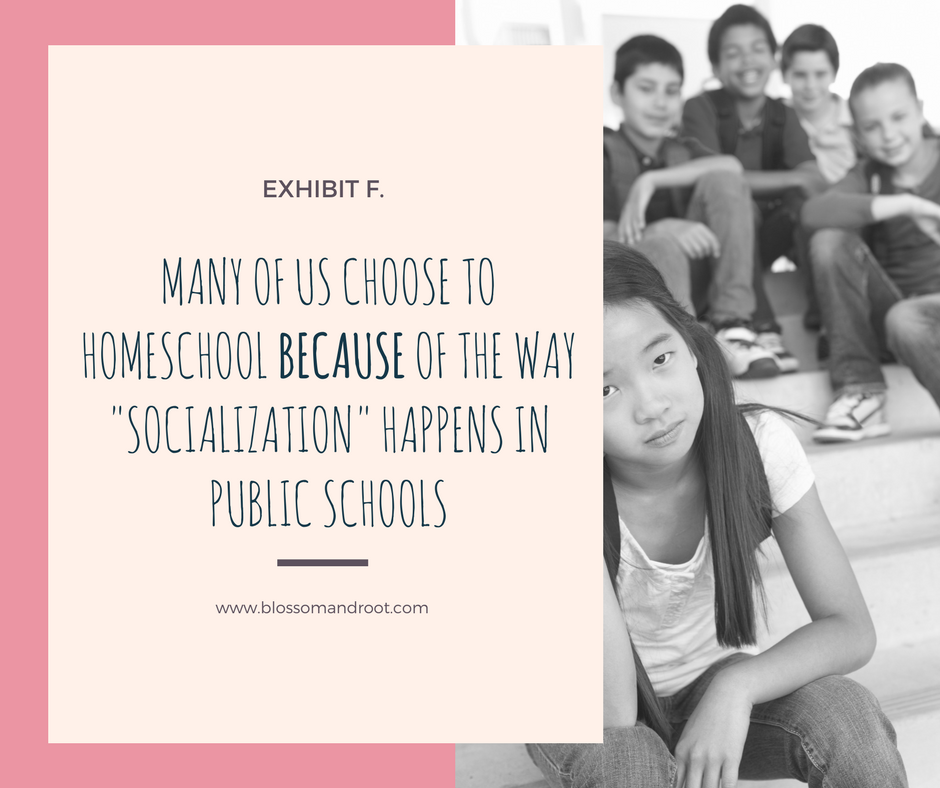
As parents, it is our job to raise our children to uphold our values and reach their full potential. This looks different for every family. For some families, public school is not a great fit concerning our values and our dream for our children, and that is why we choose to homeschool them. Sometimes, this is because of academic reasons, sometimes cultural or religious reasons, and sometimes it is because of social reasons.
We are fortunate to live in a country where we get to decide how best to educate our children. For many, public schools are the best way. For others, homeschool is. Most parents have many reasons why a particular option works best for them, and that’s really up to them to determine those. But can we please let the socialization argument go already?
Get Your FREE Trial Issue of Book Seeds By Blossom & Root!

This FREE issue, inspired by the book The Three Sunflowers by Janet Lucy, includes two weeks of activities including nature study, STEAM, art project, recipe, and exploring language and poetry. Suitable for ages 3 - 8. Grab yours today!

